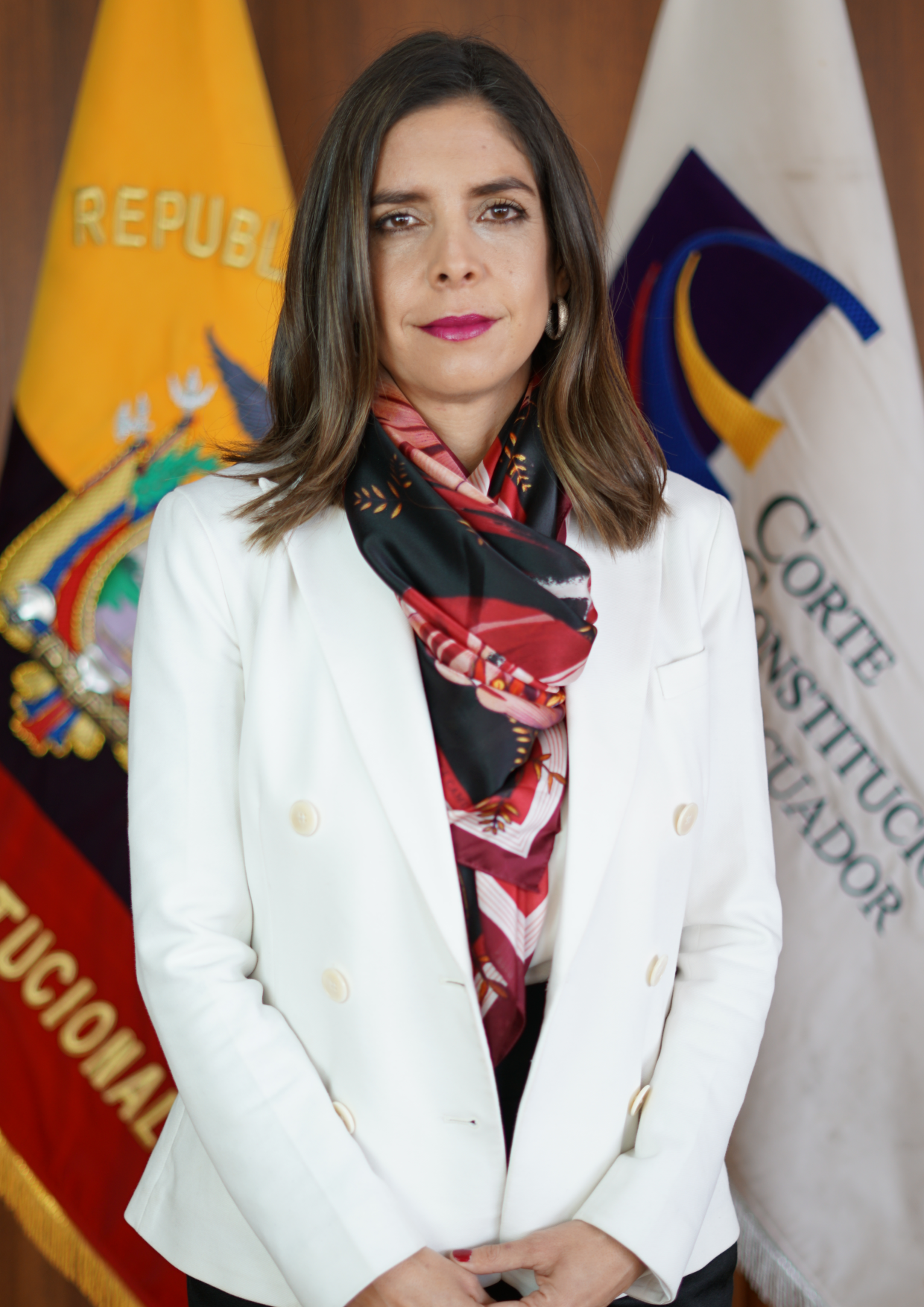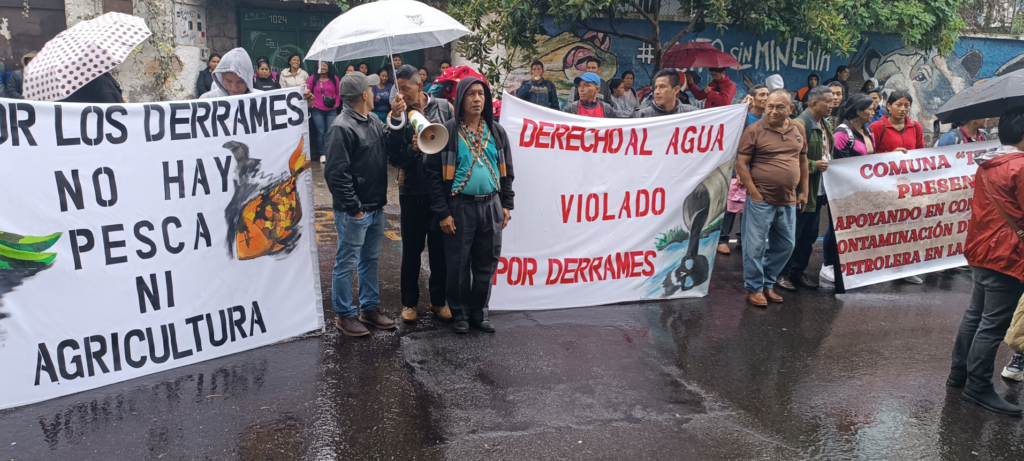“The Coca River used to give us sustenance,” says Mery Jipa, an Indigenous woman from San Pablo, a Kichwa Community on the banks of this Amazonian river. On April 7, 2020, more than 15 thousand barrels of crude oil were spilled into the Coca and Napo rivers, both tributaries of the Amazon river. It was the largest oil spill to occur in the Ecuadorian Amazon in 18 years. Since then, fishing has become difficult and crops have borne almost no fruit. Communities are severely affected by the spill.
Rivers are a source of life for Indigenous peoples. For the Kichwa nation, their access to water, their forms of recreation, their spirituality, their identity, and their food supply – through fishing and the irrigation of crops – all depend on rivers. When rivers are contaminated, the damage is multidimensional, and living conditions that are already precarious become much more difficult. Moreover, the pollution of rivers is threatening one of the most crucial ecosystems that is necessary for sustaining our shared, global climate.
“Our children complain every day about the pollution of our river: we can no longer bathe there, and we can no longer feed ourselves. Along the Coca and Napo rivers, and throughout the Kichwa nation of Ecuador, people are falling ill from diseases.”
Rafel Yumbo
President of the Federation of United Communities of the Kichwa Nation of the Ecuadorian Amazon – F.C.U.N.A.E
Adding to the environmental disaster in the 2020 oil spill, is the ineffectiveness of the Ecuadorian justice system to: bring some sort of justice. Members of 105 riverside communities organized, mobilized, and went to court to demand justice and protective measures for the population. Their goal was to prevent this kind of disaster from recurring, to secure reparations for the violation of their rights to water, health, and food, and to defend the rights of nature. Although the violation of these rights is ongoing, the community members’ claims have been ignored.
“They accused us of wanting money,” says Verónica Grefa, a young Kichwa leader from the community of Toyuca, remembering the treatment her community received from judges who favored the business interests of Petroecuador and Oleoducto de Crudos Pesado – OCP (Heavy Crude Oil Pipeline, in English). This is the company responsible for operating the Trans-Ecuadorian Oil Pipeline System (called SOTE in Spanish), whose rupture caused the oil spill. The judges went so far as to criminalize leaders and human rights defenders who accompanied the communities. Among those targeted were our colleague María Espinosa, a lawyer from Amazon Frontlines, and Vivian Idrovo, from the Alliance of Organizations for Human Rights, of which Amazon Frontlines is a member.
For María Espinosa, there is only one way to characterize the judges’ treatment of the case; it is based on racism. She notes that: “the company and the State say that the damage has already been remedied. But scientists have explained that it will be impossible for the river to recover in the short term. When you compare these positions, how can the judges declare that there was no violation of rights? This kind of result happens only in the framework of a colonial and racist State that is determined to sacrifice Indigenous lives. If a disaster like this happened in the city, the response would be immediate and efficient.”
“The Coca River has been completely destroyed, and we have no food. We are experiencing food shortages in many families. I say this because we cannot fish in the Coca River. There are no carachama fish, there are no bocachico fish, there are no catfish, there are no mota. All those species are gone. We used to have enchíparos and herons living on the banks of the river and capybaras on the islands. Where have those animals gone? They’re lost, they’re dead.”

In 2021, the communities turned to the country’s highest court, the Constitutional Court of Ecuador, to issue a ruling on the clear violation of their rights. Judge Daniela Salazar has had jurisdiction over the case for three years, and has yet to make a ruling. During that time, new oil spills due to ruptures in the SOTE system occurred in January 2022 and March 2024, affecting the same hydrographic basin.
Photo credit: Ecuador Constitutional Court.
On February 20, 2024, standing in the rain in front of the Constitutional Court building in the city of Quito, a group of 150 people raised their voices against injustice. They had traveled far from their homes to represent their communities in the fight against pollution and the struggle to protect one of the most important ecosystems on the planet.

“We don’t have anything to feed our children anymore. We used to be able to get all the food we needed from the river and the fertile riverbanks. Now we can’t even plant bananas, cassava, or corn because everything is contaminated.”
Alex Siquihua
Community of Huayusa
Coca River
Time is of the essence for these communities because, in July 2024, the OCP company will transfer management of the SOTE (the Trans-Ecuadorian Oil Pipeline System) to the Ecuadorian State. This will make it much more difficult to achieve accountability. It will also increase the likelihood of impunity for those responsible for the oil spills, which is the result favored by the State. Therefore, a timely ruling from the Court is necessary and urgent.
“The Court can order that the case be tried again. On the other hand, the Court could also broaden its analysis and, as the highest body entrusted with the protection of rights, it can order that the necessary measures be taken to protect the 27,000 victims of the oil spill. Thus, the Court has the power to ensure that these disastrous incidents never happen again.”
Maria Espinosa
Human Rights Defender
and Attorney for Amazon Frontlines




